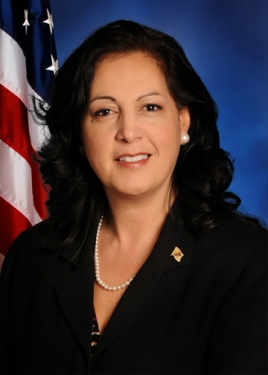The Illinois Department of Veteran Affairs is making new efforts to help female veterans get necessary healthcare needs met. While female members of the armed services have only been able to be involved in combat situations since 2013, women have been involved in the military since World War II. Acting director of the Illinois Department of Veteran Affairs, and a former veteran herself, Linda Chapa La Via recently spoke with many healthcare organizations and community partners in Springfield about some of the differences that female military members face when they reintegrate back into society and need healthcare or help with their children. “Female veterans are about 10% of the population across the country right now, but we’re about 20% of the armed forces currently. As women are transitioning to come out or in and getting ready to transition out, there are a lot of areas that we should be looking at in helping the VA to facilitate that transition. The VA right now has been equipped to provide proper maternity care for female veterans. Female veterans find it difficult to find prosthetic designs for their body to be quite common. Female veterans find additional challenges because our bodies change as we go through different periods in our lives, whether we have pregnancies or not.”
Chapa LaVia says that the all-too-common problems of depression, post-traumatic stress, and emotional trauma are not limited to male counterparts in the military either. “Right now, 1 out of 4 women suffer some kind of sexual trauma while in the military. That also puts female veterans at an increased risk of depression, substance abuse, post-traumatic stress, and homelessness. One of the things that’s very startling in that a recent study we’ve found is that female veterans are 250% more likely to commit suicide than civilian women.”
Chapa La Via says that female military members have always strived to be equal to their fellow male soldiers but healthcare has shown that some differences are necessary. “What we are trying to do is educate some of the healthcare providers and non-profits about why they should make that extra effort to obtain whether they served or not, whether they are a reservist or a veteran so that they can provide female military members care that wraps around them rather than shoving them into a plan. I enlisted in the late 1980s and the care back then, what we went through for equality is different. What we are seeing come to the surface now isn’t quite working. Female veterans have always felt its one army, one soldier as opposed to gender differences. We fought that hard to get equality because we didn’t want to be seen as different from our fellow soldiers, but we are different and we do go through different things when it comes to healthcare.”
Chapa La Via says that only the Hines, Illinois facility currently is able to take homeless female veterans and their children, which is one of the extra hurdles that female veterans face compared to their male counterparts. Chapa La Via says that IDVA is working to find programs that are suitable for everyone and that facilities will take men and women for health services at all locations. For more information about healthcare services or any military services like pensions as a veteran, you can call IDVA at 1-800-437-9824.




